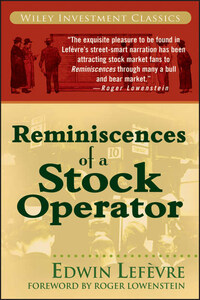Copyright © 1993, 1994 by Expert Trading, Ltd.
Foreword © 2006 by Roger Lowenstein
Published by John Wiley & Sons, Inc., Hoboken, New Jersey
Published simultaneously in Canada
Originally published in 1923 by George H. Doran and Company.
No part of this publication may be reproduced, stored in a retrieval system, or transmitted in any form or by any means, electronic, mechanical, photocopying, recording, scanning, or otherwise, except as permitted under Section 107 or 108 of the 1976 United States Copyright Act, without either the prior written permission of the Publisher, or authorization through payment of the appropriate per-copy fee to the Copyright Clearance Center, Inc., 222 Rosewood Drive, Danvers, MA 01923, (978) 750-8400, fax (978) 750-4470, or on the web at www.copyright.com. Requests to the Publisher for permission should be addressed to the Permissions Department, John Wiley & Sons, Inc., 111 River Street, Hoboken, NJ 07030, (201) 748-6011, fax (201) 748-6008, or online at http://www.wiley.com/go/permissions.
Limit of Liability/Disclaimer of Warranty: While the publisher and author have used their best efforts in preparing this book, they make no representations or warranties with respect to the accuracy or completeness of the contents of this book and specifically disclaim any implied warranties of merchantability or fitness for a particular purpose. No warranty may be created or extended by sales representatives or written sales materials. The advice and strategies contained herein may not be suitable for your situation. You should consult with a professional where appropriate. Neither the publisher nor author shall be liable for any loss of profit or any other commercial damages, including but not limited to special, incidental, consequential, or other damages.
For general information on our other products and services or for technical support, please contact our Customer Care Department within the United States at (800) 762-2974, outside the United States at (317) 572-3993 or fax (317) 572-4002.
Wiley also publishes its books in a variety of electronic formats. Some content that appears in print may not be available in electronic books. For more information about Wiley products, visit our web site at www.wiley.com.
Library of Congress Cataloging-in-Publication Data
Lefèvre, Edwin, 1871–1943.
Reminiscences of a stock operator / Edwin Lefèvre.
p. cm. – (Wiley investment classics) Originally published: New York: G.H. Doran, 1923. Includes index.
ISBN-13: 978-0-471-77088-6 (pbk.) ISBN-10: 0-471-77088-4 (pbk.) 1. New York Stock Exchange. 2. Speculation. I. Title. II. Series.
HG4572.L4 2006
332.64′273 – dc22
2005043672
In the late 1970s, when I was thirsting for a job in journalism, The Wall Street Journal hired me to cover the copper market. My assignment was to get to know the traders who bought and sold copper futures and submit a report on the daily fluctuations. It being an era of high inflation, copper was bullishly inclined, and under my untutored but watchful eye its price increased from 80 cents a pound to 90 cents to, eventually, $1. Promptly I reported (after canvassing my newfound sources) that copper was rising on account of there being “more buyers than sellers.”
“More buyers than sellers!” my editor guffawed. He was a clownish man with a pointed head; he saw humor in everything, in particular his new cub reporter. “Your job is to tell us why there are more buyers than sellers.”
This seemingly straightforward advice led me into a maze of trader’s lore that came to seem indistinguishable from outright guesswork if not invention. On some days, I was told that the advance (or, as it were, the decline) was triggered by “investors,” and was therefore predictive of the future trend. On other days, the price change was ascribed to “speculators,” evidently a less reliable sort. Most mysteriously of all, the price could move for “technical reasons,” which advances I was urged to dismiss as having no significance whatsoever. Still, it was rising, wasn’t it?
Copper cracked $1.50 and throughout its run paid not the slightest heed to the “reasons” I was dutifully laying bare. I knew that something in my analyses was deficient, but I didn’t know what. The problem was a lack of preparation. I hadn’t read Edwin Lefèvre’s Reminiscences of a Stock Operator; therefore, I did not know how to write about commodities markets, or stock markets, or any other kind of market.
If I had read it, I would have understood that “the tape” utters a more powerful argument than any reason or affidavit; you do not argue with the tape, you do not explain it or deconstruct it. And I would have read it on the third page and I would have read it in a single paragraph:








